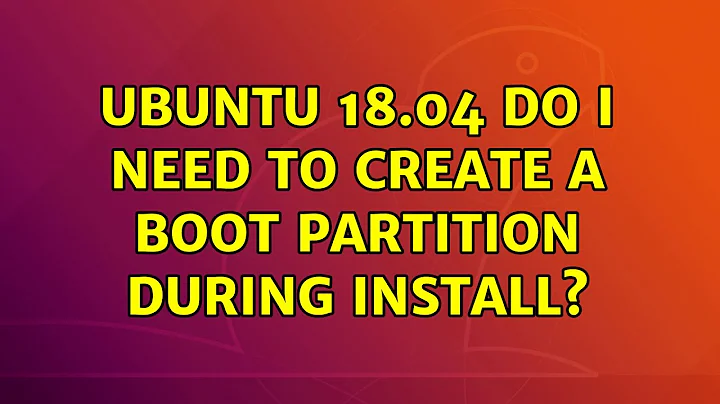Ubuntu 18.04 Do I need to create a boot partition during install?
GPT disks can boot in Legacy (BIOS) mode, and in EFI mode.
To boot a GPT disk with Legacy (BIOS) mode, you need to have a "BIOS Boot" partition. This is entirely different from a /boot partition.
My BIOS Boot partition goes from sector 34 to sector 2047. Its size is 1007.0 KiB. Its type is EF02.
You do not need a /boot partition (unless your root partition is encrypted).
You also do not need a swap partition. I never use swap.
If you are booting in EFI mode, then you need an EFI system partition (ESP). This is not the BIOS boot partition. It is also not the /boot partition, at least on Ubuntu. (Theoretically, the ESP could also be /boot, but the Ubuntu installer, as of 18.04, does not support this configuration.)
Related videos on Youtube
Toby
Updated on September 18, 2022Comments
-
 Toby over 1 year
Toby over 1 yearHi I’m just wondering if it’s essential to create a boot partition during Ubuntu 18.04 installation besides root and swap. I plan on installing only Ubuntu on my desktop.
I’m only asking because the Ubuntu help link https://help.ubuntu.com/community/DiskSpace tells me I have to install the Bios/EFI partition(not /boot partition) if my drive is a GPT type (500gb SSD if you’re wondering) and that I wanted to make sure this information is still up to date.
In case you ask, I tried to search for answers similar to this as much as I could but they don’t relate to this. Even if there was one, it’s been years ago. Again, I’m asking this just so this helps anyone without having to write repeated questions.
-
 Scott Stensland about 5 yearsNo you do not need to go out of your way to create any partition during install
Scott Stensland about 5 yearsNo you do not need to go out of your way to create any partition during install -
 Toby about 5 yearsNo, I have no intention of dual booting. If you must ask, I intend to install root and home partition on that SSD. I also intend to mount a HDD (4tb) and another SSD (1tb) to my desktop as storage while I use symlinks on my HDD to the home directory. As for your boot partition question, I’m talking about the BIOS/EFI partition one as said by the Ubuntu help when installing to a GPT type drive.
Toby about 5 yearsNo, I have no intention of dual booting. If you must ask, I intend to install root and home partition on that SSD. I also intend to mount a HDD (4tb) and another SSD (1tb) to my desktop as storage while I use symlinks on my HDD to the home directory. As for your boot partition question, I’m talking about the BIOS/EFI partition one as said by the Ubuntu help when installing to a GPT type drive. -
 Toby about 5 yearsWhile I say this, just let me know if there’s anything I’m missing or that I have to add or remove.
Toby about 5 yearsWhile I say this, just let me know if there’s anything I’m missing or that I have to add or remove. -
 Toby about 5 yearsOnce more, I’m just asking this because I don’t want to break anything in the long run for not having a Bios/EFI partition in my GPT drive.
Toby about 5 yearsOnce more, I’m just asking this because I don’t want to break anything in the long run for not having a Bios/EFI partition in my GPT drive. -
oldfred about 5 yearsDo not confuse the ESP - efi system partition (FAT32) which does have some UEFI boot files with Ubuntu's /boot partition with kernel & more boot files. Most desktops do not need a /boot partition, but if UEFI you do need the ESP.
-
 Toby about 5 yearsOk so is the ESP the same as the one described in the Ubuntu help document for installing in GPT drives?
Toby about 5 yearsOk so is the ESP the same as the one described in the Ubuntu help document for installing in GPT drives?
-
-
 Toby about 5 yearsSo does that mean I never needed it to begin if I don’t encrypt my root partition? If you’re curious, I plan to install root and home partition to my SSD while mounting an HDD (4tb) and another SSD (1tb) for storage.
Toby about 5 yearsSo does that mean I never needed it to begin if I don’t encrypt my root partition? If you’re curious, I plan to install root and home partition to my SSD while mounting an HDD (4tb) and another SSD (1tb) for storage. -
mpb about 5 yearsI strongly suspect that you do not need a
/bootpartition. The only cases I am aware of where you need a/bootpartition are if you are encrypting/. Or if/is a non-standard filesystem like ZFS. Basically, GRUB (the bootloader) needs to be able to read the kernel andinitrdfrom/boot. I believe the/bootfolder can be on any partition that GRUB can read. There is, of course, only one way to see if you really need a/bootpartition. Try installing Ubuntu without one and see if it works.




